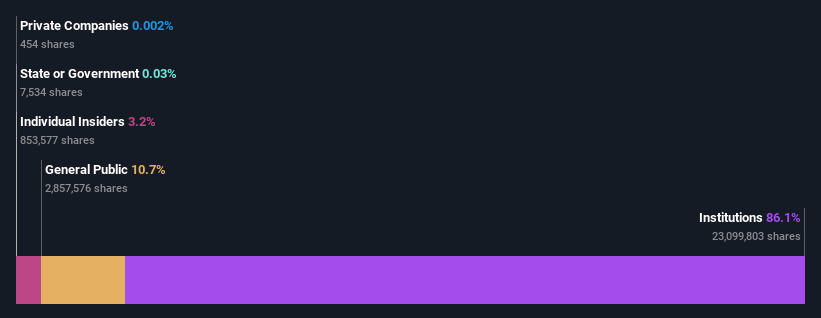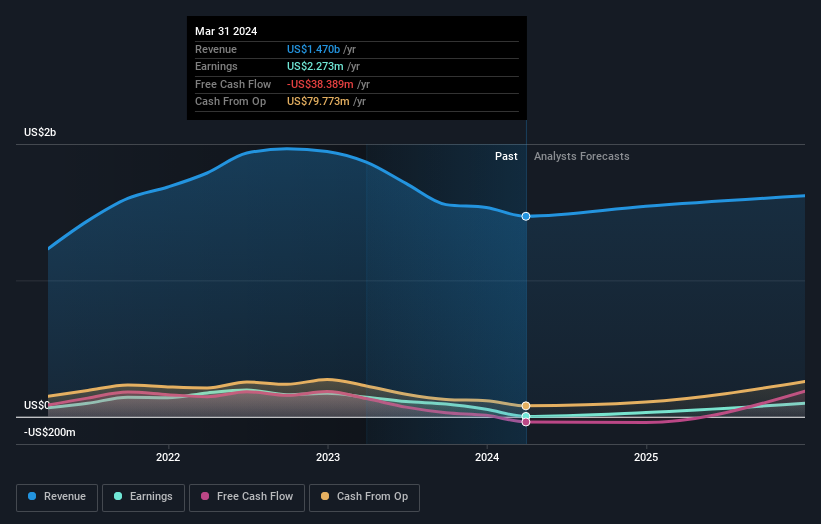AdvanSix Inc. (NYSE:ASIX) is largely controlled by institutional shareholders who own 86% of the company
Key Insights
Significantly high institutional ownership implies AdvanSix's stock price is sensitive to their trading actions
A total of 7 investors have a majority stake in the company with 52% ownership
Using data from company's past performance alongside ownership research, one can better assess the future performance of a company
To get a sense of who is truly in control of AdvanSix Inc. (NYSE:ASIX), it is important to understand the ownership structure of the business. With 86% stake, institutions possess the maximum shares in the company. In other words, the group stands to gain the most (or lose the most) from their investment into the company.
Since institutional have access to huge amounts of capital, their market moves tend to receive a lot of scrutiny by retail or individual investors. Hence, having a considerable amount of institutional money invested in a company is often regarded as a desirable trait.
Let's take a closer look to see what the different types of shareholders can tell us about AdvanSix.
See our latest analysis for AdvanSix
What Does The Institutional Ownership Tell Us About AdvanSix?
Institutions typically measure themselves against a benchmark when reporting to their own investors, so they often become more enthusiastic about a stock once it's included in a major index. We would expect most companies to have some institutions on the register, especially if they are growing.
We can see that AdvanSix does have institutional investors; and they hold a good portion of the company's stock. This can indicate that the company has a certain degree of credibility in the investment community. However, it is best to be wary of relying on the supposed validation that comes with institutional investors. They too, get it wrong sometimes. It is not uncommon to see a big share price drop if two large institutional investors try to sell out of a stock at the same time. So it is worth checking the past earnings trajectory of AdvanSix, (below). Of course, keep in mind that there are other factors to consider, too.
Investors should note that institutions actually own more than half the company, so they can collectively wield significant power. Hedge funds don't have many shares in AdvanSix. BlackRock, Inc. is currently the largest shareholder, with 18% of shares outstanding. Victory Capital Management Inc. is the second largest shareholder owning 9.7% of common stock, and The Vanguard Group, Inc. holds about 7.4% of the company stock. Additionally, the company's CEO Erin Kane directly holds 1.7% of the total shares outstanding.
We did some more digging and found that 7 of the top shareholders account for roughly 52% of the register, implying that along with larger shareholders, there are a few smaller shareholders, thereby balancing out each others interests somewhat.
While it makes sense to study institutional ownership data for a company, it also makes sense to study analyst sentiments to know which way the wind is blowing. There is some analyst coverage of the stock, but it could still become more well known, with time.
Insider Ownership Of AdvanSix
While the precise definition of an insider can be subjective, almost everyone considers board members to be insiders. Company management run the business, but the CEO will answer to the board, even if he or she is a member of it.
Insider ownership is positive when it signals leadership are thinking like the true owners of the company. However, high insider ownership can also give immense power to a small group within the company. This can be negative in some circumstances.
We can report that insiders do own shares in AdvanSix Inc.. In their own names, insiders own US$20m worth of stock in the US$618m company. This shows at least some alignment. You can click here to see if those insiders have been buying or selling.
General Public Ownership
The general public-- including retail investors -- own 11% stake in the company, and hence can't easily be ignored. While this group can't necessarily call the shots, it can certainly have a real influence on how the company is run.
Next Steps:
While it is well worth considering the different groups that own a company, there are other factors that are even more important. Be aware that AdvanSix is showing 2 warning signs in our investment analysis , and 1 of those is a bit unpleasant...
If you are like me, you may want to think about whether this company will grow or shrink. Luckily, you can check this free report showing analyst forecasts for its future.
NB: Figures in this article are calculated using data from the last twelve months, which refer to the 12-month period ending on the last date of the month the financial statement is dated. This may not be consistent with full year annual report figures.
Have feedback on this article? Concerned about the content? Get in touch with us directly. Alternatively, email editorial-team (at) simplywallst.com.
This article by Simply Wall St is general in nature. We provide commentary based on historical data and analyst forecasts only using an unbiased methodology and our articles are not intended to be financial advice. It does not constitute a recommendation to buy or sell any stock, and does not take account of your objectives, or your financial situation. We aim to bring you long-term focused analysis driven by fundamental data. Note that our analysis may not factor in the latest price-sensitive company announcements or qualitative material. Simply Wall St has no position in any stocks mentioned.

 Yahoo Finance
Yahoo Finance 

